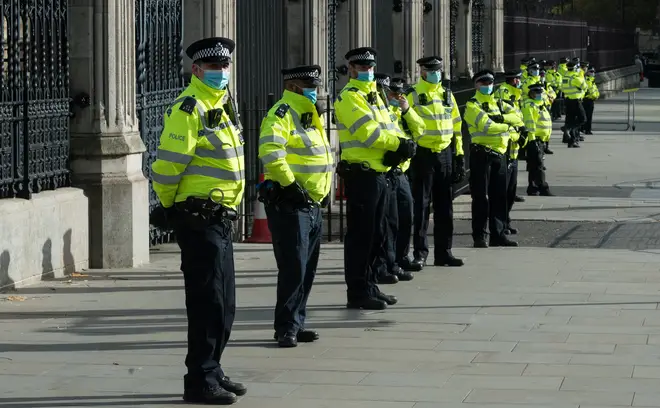
Nick Ferrari 7am - 10am
20 April 2021, 00:04

Some police forces did not follow self-isolation rules when staff came into contact with someone who had coronavirus symptoms, a new report has found.
Instead they instigated regimes which were contrary to national guidance and may have broken the law, Her Majesty's Inspectorate of Constabulary and Fire & Rescue Services said.
It came amid "confusion" over the requirements and concerns about the "potential adverse effect of losing resources".
READ MORE: More than 10 million people in UK now fully vaccinated against Covid-19
READ MORE: Covid: India added to red list after new virus strain detected
The report said: "Forces sometimes saw self-isolation as unnecessary and possibly resulting in relatively large numbers of staff being told to isolate within some teams.
"Some forces therefore created their own systems to reduce self-isolation for staff not displaying symptoms, contrary to national guidance.
"We also heard about force policies where senior officers did risk assessments to circumvent the need to self-isolate.
"This was after staff told them they had received a direction from the app or the national contact tracing service to self-isolate.
"Again, this was contrary to national guidance and, in the case of a direction from the NHS contact trace service, a criminal offence under the Health Protection (Coronavirus, Restrictions) (Self-Isolation) (England) Regulations 2020."

India will become a red list country, Matt Hancock confirms
The findings, from an inspection carried out between March and November last year, urged forces to "immediately" put in place policies to address the situation, adding: "Forces must follow the guidance and self-isolation directions when members of the workforce come into contact with someone with coronavirus symptoms."
The report also found "some forces increased the number of crimes they decided not to investigate because they were unlikely to be solved, and reduced their in-person visits to registered sex offenders" to reduce the risk of infection.
These may have been "sensible decisions" at the start of the outbreak, but concerns were raised at the impact these measures could have on victims, it said.
While this prevented "workloads becoming unmanageable, allowing more time to concentrate on more serious offences and those with clear lines of inquiry", inspectors said they had "concerns about the possible detrimental effect for victims resulting from any changes in approach.
"Any changes in decisions about whether to investigate offences with viable lines of inquiry or named suspects would be especially worrying," the report added.

Labour leader kicked out of Bath pub by landlord
Inspectors asked forces to keep any such changes under review and consider the effect this could have on the public before deciding whether to adopt any of them permanently.
Overall, police were praised for their efforts in enforcing coronavirus lockdown rules at short notice.
Inspectors acknowledged officers "faced an extremely difficult situation of fast-paced announcements" detailing rapidly changing new laws and guidance.
This "affected the police service's ability to produce guidance and to brief staff" and "inevitably led to some errors or inconsistencies in approach", the report said, as it highlighted examples which prompted criticism for being "heavy handed".
These included incidents where road checks and drone surveillance were carried out, and the issuing of court summons for "non-essential shopping or excessive exercise",
The report added: "In this context, policing at all levels did very well to operate coherently and to maintain public support."
Inspector of constabulary Matt Parr said: "Overall, the police rose to the challenge with dedication and commitment by taking immediate and decisive action to keep people safe and prevent crime, while also learning lessons from the rare occasions that they got it wrong."
Martin Hewitt, chairman of the National Police Chiefs' Council, said the report recognised the past 12 months had been "one of the biggest challenges to face modern policing, and that the service has stepped up and met that challenge head on".
He added: "We haven't always got things right straightaway, and we have sought throughout the pandemic to learn as we go and improve the service we provide."
A Home Office spokesperson said: "The police have worked tirelessly to keep us safe during the pandemic and as this report shows, took immediate and decisive action to help protect the NHS and save lives.
"Whilst the majority of us have been able to stay at home, our courageous officers have been out on the streets pursuing criminals, protecting the public and enforcing the coronavirus rules where necessary."